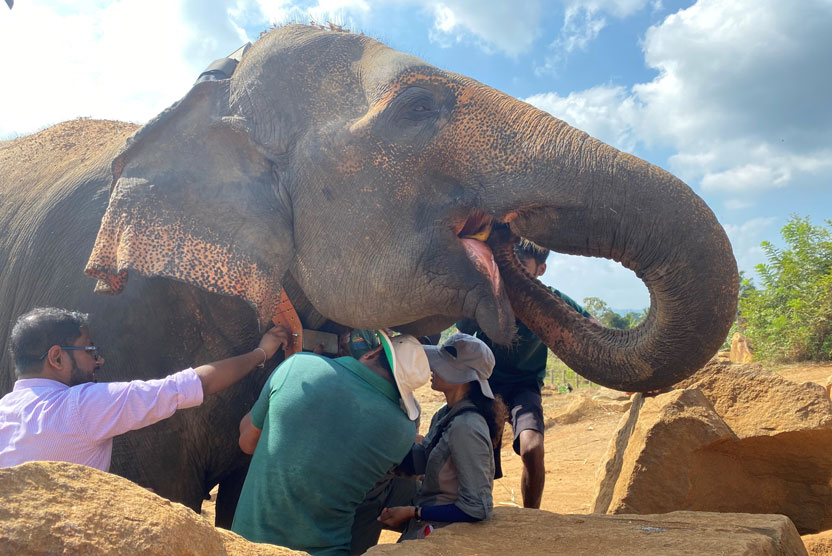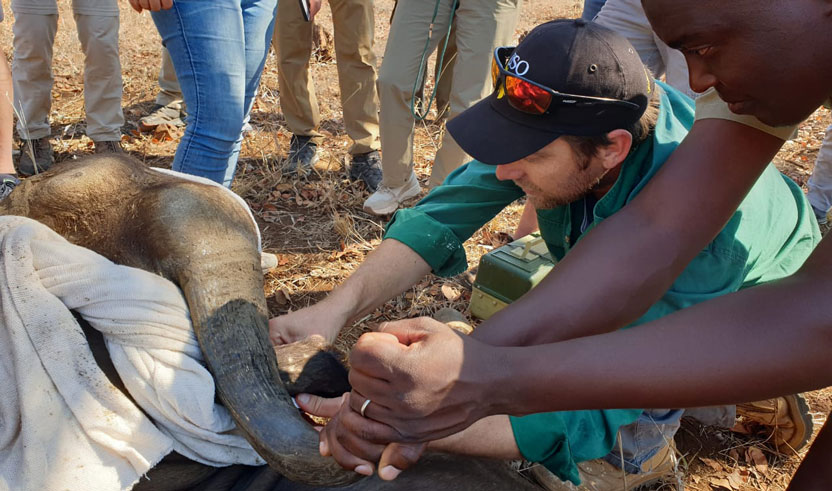
Not only did Dr Benjamin Allen have to contend with having his lunch stolen by samango monkeys while fulfilling his Graeme Caughley Travelling Fellowship, there were also the matters of civil unrest and the outbreak of a pandemic.
Dr Allen, a senior research fellow at the University of Southern Queensland, received the award in late 2019 and planned to travel to Sri Lanka, Nepal and South Africa in 2020, to progress international research on new wildlife management technologies.
But shortly after he arrived in Kandy, Sri Lanka, in March 2020, the country went into COVID-19-related lockdown. Dr Allen worked with colleagues there to secure a prestigious local grant for research on controlling the movements of elephants with virtual fences—work that was successfully completed in 2022 and has led to at least one publication to date.
His trip to the Smithsonian Primate Research Centre in Polonnaruwa was cancelled due to the pandemic, and could not be resumed due to the country later falling into civil unrest.
Dr Allen returned to Australia and the deadline for using the fellowship funding was extended until the end of 2022 to allow for restrictions on international travel.
He continued to liaise virtually with collaborators overseas until he could travel again in August 2022—and with a change in the work in Nepal meaning he no longer needed to travel there, Dr Allen decided to head straight for the Malilangwe Game Reserve in Zimbabwe.
“It was incredible to assist with capturing and tagging buffalo, and we were also fortunate enough to see wild dogs, lion, brown hyena, African elephant, warthog, crocodile, and several species of birds and antelope including sable, roan, nyala, impala and eland,” Dr Allen said.
“I learned a lot from this trip, and also shared my experience with new wildlife tracking technologies being applied in the reserve.”
After travelling for meetings with University of Cape Town collaborators working on a joint conservation genetics project, he spent a day with staff from the environmental consultancy NCC Environmental Services, learning about their baboon management program and planning new research to apply the technologies being developed in Australia on baboons.
The trip concluded with a visit to Hluhluwe Imfolozi National Park, participating in on-foot game surveys and wild dog translocations.
“We scoped opportunities for a formal researcher exchange program between the University of Southern Queensland and Nelson Mandela University, which operates a research field station within the park. We also saw over a dozen white rhinoceros, had our car surrounded by lions, and lost our lunch to a group of conniving samango monkeys.”
Dr Allen said that despite the disruptions, the connections made and experiences gained during the fellowship have directly led to several co-authored papers, new PhD supervisions, and collaboration on cross-country research projects.
The benefits to Dr Allen and his institution are “immeasurable,” he said.
“They include the international recognition and engagement obtained from our published works, which indirectly contributes to the rapidly rising international ranking of USQ, but also new international teaching and research opportunities now available through USQ.
“Receiving the Graeme Caughley Travelling Fellowship has, in effect, stimulated the development of similar opportunities that can now be provided to many other students and early career researchers studying wildlife management—a legacy which Graeme Caughley would surely be proud of.”
The Fellowship commemorates the work of Dr G J Caughley FAA, who was a chief research scientist with the CSIRO Wildlife and Ecology, Canberra, until his death in February 1994.
The Fellowship is financed through the generosity of his friends and colleagues, to enable ecologists resident in Australia or New Zealand to share their expertise by visiting scientific centres in countries outside of the Fellow's own country.
Read more about the Graeme Caughley Travelling Fellowship.

Lemberg and Caughley travelling fellowships awarded | Australian Academy of Science
Travelling fellowship provides new insights for wildlife management | Australian Academy of Science
Travelling fellowship and conference awardees announced | Australian Academy of Science
© 2026 Australian Academy of Science